Alabama seeks work requirement for some able-bodied Medicaid recipients

Unemployment has been shown to have a negative impact on physical and mental health outcomes. Which is why in January, Gov. Kay Ivey and state Medicaid officials revealed the plan become the newest state to institute a work requirement for some Medicaid recipients. On Thursday, that plan took a step forward when Ivey’s office announced the state will formally seek permission from the federal government to make that change to its Medicaid program. The proposal would only apple to “able-bodied” Parent or Caretaker Relative (POCR) recipients — with exemptions being made for people with disabilities, anyone who pregnant or receiving post-partum care, anyone required to care for a disabled child or adult, among others — that will require unemployed or underemployed adults to become gainfully employed, or participate in training opportunities to enhance their potential for full employment. Alabama Medicaid believes this change will put Alabamians on a path to better health outcomes. According to the proposal, proposed work requirement would impact nearly 74,000 of the state’s 1 million Medicaid recipients. As required by federal regulation, Medicaid is now opening a formal 30 day comment period. A copy of the draft Demonstration proposal will also be available upon request for public review at each county office of the Department of Human Resources and the State Office of the Alabama Medicaid Agency. Additionally, two opportunities for public comment will be held at the following locations: March 5, 2018 at 11:00 a.m. Alabama Industrial Development and Training (AIDT) Auditorium One Technology Court Montgomery, Ala. 36116 March 6, 2018 at 11:00 a.m. Hoover Public Library 200 Municipal Drive Hoover, Ala. 35216 Critics contend the work requirements are based on falsehoods and vilify those who are on Medicaid. “We will not improve the health of people in our state, nor will we improve the state’s economy, by forcing people to work when they are not healthy,” said Samuel Brooke, Deputy Legal Director, Economic Justice Project at the Southern Poverty Law Center (SPLC). “This proposal would unnecessarily increase the burdens of the working poor, and end up costing the state more money by cutting people from the Medicaid rolls and forcing them and their families to use emergency rooms – subsidized by taxpayers – for routine health services.”
Alabama’s prison system back on trial this week

Alabama’s prison system is back on trial this week. The trial marks the latest stage in a lawsuit the Southern Poverty Law Center (SPLC) and the Alabama Disabilities Advocacy Program filed in 2014 against the Alabama Department of Corrections (ADOC) to end the poor conditions in the state prison system, including the understaffing of both correctional and mental health workers. According to the SPLC, the state has yet to come up with an acceptable remedy to address the “horrendously inadequate” and unconstitutional mental health care and staffing needs of the ADOC. The SPLC will argue just that in its closing arguments scheduled for Wednesday, Jan. 24 at 3 p.m. They follow weeks of testimony outlining ADOC’s plans to increase mental health and correctional officer staffing, raise personnel pay, and enhance outreach to potential new hires. Alabama legislators have requested $80 million over the next year and a half to address the issues plaguing the ADOC. But according to the SPLC, that amount does not address the current shortfalls, nor does it take into consideration decades of inadequate funding. “As Gov. Kay Ivey and ADOC Commissioner Jeff Dunn have both recognized, the constitutional violations of how the state treats prisoners developed over a generation. It will be difficult, and likely costly, to fix them. But ADOC has to fix them,” said Maria Morris, senior supervising attorney for the SPLC, and lead litigator in the case. “ADOC needs to be fast, creative and aggressive in figuring out how to come into compliance with the Constitution,” Morris added. “The recent budget request for ADOC covers little more than the expected increase in the system’s health care costs, and does nothing to address correctional staff shortages or the unconstitutional level of care.” Responding to the federal lawsuit in June 2017, the U.S. District Court issued a 302-page ruling declaring that Alabama’s prison system has failed to provide mental health care to the state’s prison population and is in violation of the Eighth Amendment’s prohibition on cruel and unusual punishment. “Given the severity and urgency of the need for mental-health care explained in this opinion, the proposed relief must be both immediate and long term,”U.S. District Judge Myron Thompson wrote in his decision. State officials denied providing inadequate mental health treatment, but the judge cited evidence to the contrary from inmates and prison officials. One inmate killed himself days after testifying, prompting the state to agree to new suicide prevention methods while the trial continued. The judge acknowledged that the department blames lack of funding, but said money alone couldn’t make up for such poor treatment, and sweeping change is required. Alabama’s state prison system houses nearly twice the inmates it was designed for. Prison officers and inmates have been killed and injured in a series of violent crimes behind bars.
Questions about the Southern Poverty Law Center continue

The group who once combatted hate groups like Ku Klux Klan (KKK) is now labeling pretty much any group, person or term they disagree with as “hate.” Birmingham’s Southern Poverty Law Center (SPLC), a non-profit that claims it is “dedicated to fighting hate and bigotry and to seeking justice for the most vulnerable members of our society,” is under scrutiny once again for trying to profit from “selling” hate, rather than tracking it. Libertarian TV personality and author John Stossel is among those who have recently questioned some of the SPLC’s hate labels that he doesn’t believe amount to hate whatsoever: Ayaan Hirsi Ali grew up in Somalia, where she suffered female genital mutilation. So now she speaks out against radical Islam. For that, SPLC put her on its list of dangerous “extremists.” Maajid Nawaz was once an Islamic extremist. Then he started criticizing the radicals. SPLC labels him an “anti-Muslim extremist,” too. …They call the Family Research Council a hate group because it says gay men are more likely to sexually abuse children. In the Wendesday Reason.com piece, Stossel went on to assert the SPLC is no longer stopping hate, but “selling hate.” He went on to say: I suspect SPLC labels lots of groups “haters” because crying “hate” brings in money. … SPLC is now a hate group itself. It’s a money-grabbing slander machine. And Stossel isn’t the only one who thinks so. William Jacobson, a law professor at Cornell and critic of the SPLC, told POLITICO over the summer the group has wrapped itself in the mantle of the civil rights struggle to engage in partisan political crusading. “Time and again, I see the SPLC using the reputation it gained decades ago fighting the Klan as a tool to bludgeon mainstream politically conservative opponents,” Jacobson said. “For groups that do not threaten violence, the use of SPLC ‘hate group’ or ‘extremist’ designations frequently are exploited as an excuse to silence speech and speakers,” Jacobson added. “It taints not only the group or person, but others who associate with them.” That doesn’t stop others from seeing the SPLC as the answer to America’s divisiveness. Just last year Apple CEO Tim Cook informed employees that his company is giving $1 million to SPLC and matching employee donations. J.P. Morgan Chase also pitched in $500,000, specifically to further the SPLC’s “work in tracking, exposing and fighting hate groups and other extremist organizations,” said Peter Scher, the bank’s head of corporate responsibility. But what exactly is their money paying for? According to same POLITICO piece, Ken Silverstein, a liberal journalist and another critic of the group “attributes the growing scope of the SPLC’s censures to a financial imperative to wade into hot-button issues that will rile donors.” “The organization has always tried to find ways to milk money out of the public by finding whatever threat they can most credibly promote,” Silverstein told the publication. Such appeared to be the case at Christmas. On Christmas, the SPLC ranked hashtags they found offensive. Shockingly, “#MerryChristmas” topped the list as the second most offensive hashtag of the day. The Hate Tracker website also listed #Christmas, #MerryChristmasEve and #Jesus in its top hateful trends used by what it deems “far-right Twitter users.” “The SPLC is willing to lump anyone who says “Merry Christmas” or “Jesus” in with the most violent and racist groups in America,” Liberty Counsel stated. “This is one more way that the SPLC is exposing its own radical, discredited, anti-Christian hate.” The SPLC said it’s not tracking hate, just hateful“far-right Twitter users” and what they’re saying. “‘Hate Tracker’ webpage doesn’t actually track hate – it just tracks what is being tweeted by allegedly hateful people,” said the SPLC. Nevertheless, many are still left wondering if the SPLC’s mission-focused days are a thing of the past, and if a simple difference of opinion is all it takes to be labeled a hater.
SPLC pushes back against Kay Ivey’s Drug Task Force decision
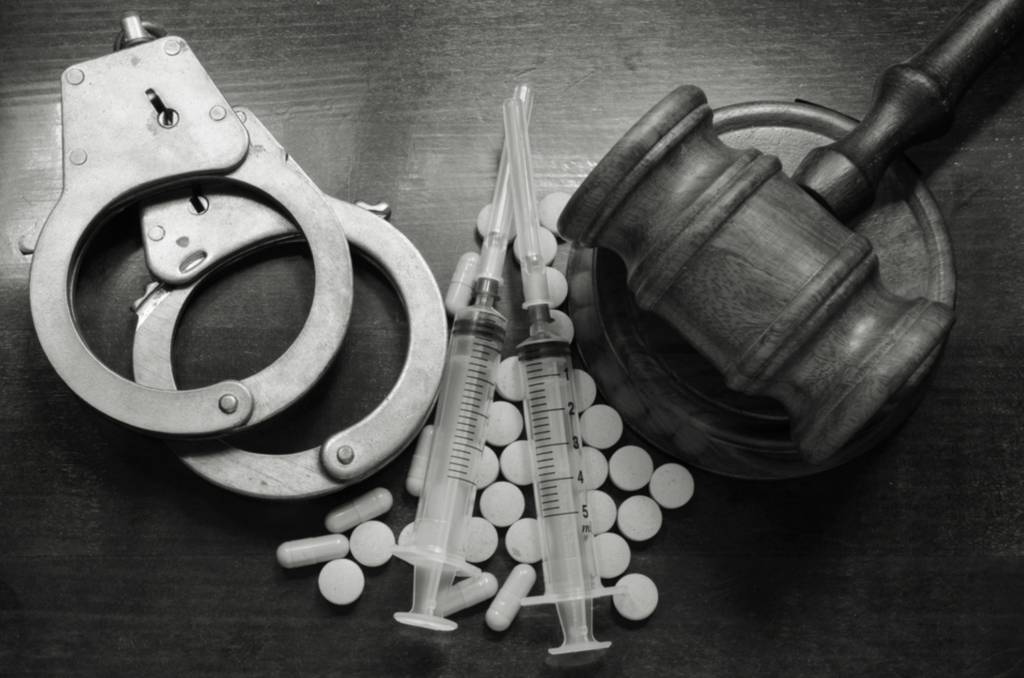
On Thursday, Alabama Gov. Kay Ivey announced the state will use $1.3 million in federal grant money to establish a new statewide drug task force that will operate in cooperation with local and state law enforcement agencies. The total task force will comprise more than 90 officers from more than 40 agencies and will operate alongside 25 narcotics agents from the Alabama Law Enforcement Agency forming seven regional multi-jurisdictional offices. These units will share resources with a unified goal of reducing the impact of drugs and dismantling drug organizations in Alabama. Friday morning, the Southern Poverty Law Center (SPLC) pushed back against Ivey’s announcement saying treatment and access to anti-overdose drugs, not prosecution, is the most effective way to combat the state’s opioid epidemic. “Governor Ivey’s misguided decision to invest $1.3 million in creating a Drug Enforcement Task Force indicates she is ignoring the advice of medical professionals, public health experts, and the Alabama Opioid Overdose and Addiction Council she herself created by executive order – all of whom agree that treatment and access to anti-overdose drugs, not prosecution, is the most effective response to the devastation caused by the opioid epidemic,” said Lisa Graybill, Deputy Legal Director of the SPLC Graybill continued, “Alabama has the highest rate of opioid prescription among all 50 states, and we can’t afford to get this wrong. But Governor Ivey is throwing money away by investing in the same lock ‘em up approach of the failed war on drugs, which will accomplish little beyond sending yet more people into an already horrifically overcrowded Alabama prison system with ‘persistent and severe shortages of mental-health staff and correctional staff.’ We can’t prosecute our way out of this public health crisis. Hiring more police won’t save lives; treatment will, and that’s where taxpayers’ money should go.”
George and Amal Clooney donate $1M to Montgomery org to fight hate groups

George and Amal Clooney are donating $1 million to fight hate groups. The couple announced Tuesday that their Clooney Foundation for Justice is supporting the Southern Poverty Law Center with a $1 million grant to combat hate groups in the United States. George Clooney says in a statement Tuesday that they wanted to add their voices and financial assistance to the fight for equality. Clooney said, “There are no two sides to bigotry and hate.” The Southern Poverty Law Center monitors the activities of more than 1,600 extremist groups in the U.S. and has used litigation to win judgments against white supremacist organizations. Last month, the Clooney Foundation announced a $2 million grant to support education for Syrian refugee children. Republished with permission of The Associated Press.
SPLC asks Alabama to restore voters to ‘active’ status by next month
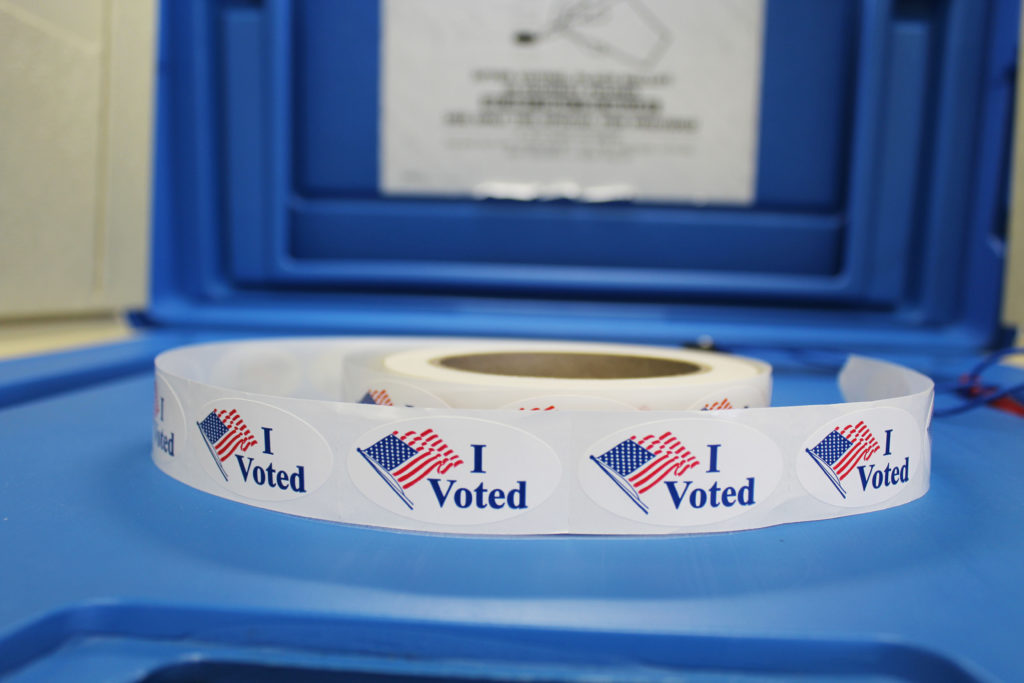
Last Tuesday, Alabama voters across the state fund themselves listed as inactive when they arrived at the polls to vote in the special U.S. Senate primary. Now the Southern Poverty Law Center (SPLC) is asking Alabama Secretary of State John Merrill to reinstate those roughly 340,162 Alabamian voters before the September 26 Senate runoff. According to the federal National Voter Registration Act (NVRA) as well as state laws, every four years cards are sent to voters to verify voter addresses in order to maintain their “active” voting status. If they’re marked “return to sender” twice, the voter is put on the inactive list. In a Friday letter to Merrill, the SPLC said they believers voters were inaccurately moved to inactive and the state’s process was “deeply flawed” and that it was “imperative you take immediate corrective action to return inactive voters to the active voting list.” Inactive voters are able to restore their active status by filling out a form at the polls, but the SPLC says that process may dissuade voters from showing up to vote. Voters who are unsure of their voting status may check it online here. To check via phone voters can call the Secretary of State’s Office at (334) 242-7210 or at their local board of registrars office.
SPLC names 917 “hate groups” across country, 27 in Alabama
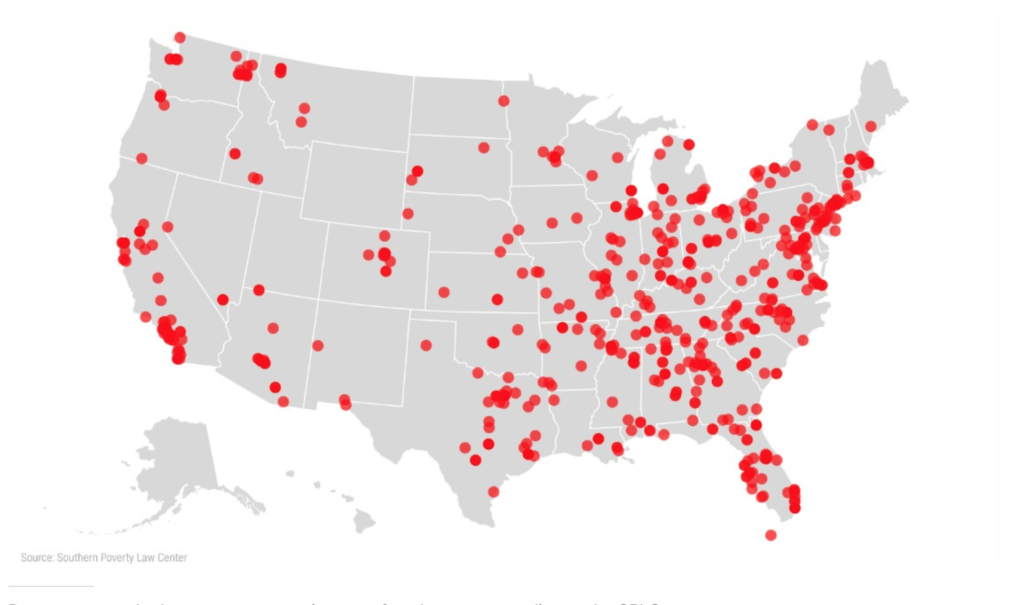
At least 27 “hate groups” are operating in Alabama, according to Birmingham’s Southern Poverty Law Center (SPLC), a non-profit that claims it is “dedicated to fighting hate and bigotry and to seeking justice for the most vulnerable members of our society.” The center has various categories for the 27 groups, which are part of 917 designated groups nationwide, like Neo-Nazis, White Nationalists, Racist Skinheads, Anti-Immigrant, Anti-LGBT and Black Separatists among other categories. The list is compiled as part of the Hatewatch project and designates a hate group as an organization with “beliefs or practices that attack or malign an entire class of people, typically for their immutable characteristics.” “Over the course of a year, we have a team of investigators that scours the internet for racist publications and real world activities to find out which groups exist, which groups are still active and which groups come along,” said Ryan Lenz, a senior investigative reporter for the SPLC’s Hatewatch project. But not everyone agrees with the SPLC’s “hate” classification of the 917 groups. Some critics of the SPLC say the group’s activism biases how it categorizes certain groups. Many mainstream conservative groups, such as the Family Research Council, the Pacific Justice Institute and the Alliance Defending Freedom were put on the SPLC list. “Why is the Southern Poverty Law Center doing this? It’s simple. They want to vilify and isolate anyone that doesn’t agree with their very extremist leftist policy and ideology,” Brad Dacus president of the Pacific Justice Institute, which specializes in religious-liberty cases, told CNN. “This isn’t about defending civil rights; this is about attacking civil rights.” Data for the “Hate Map” list was compiled using hate group publications and websites, citizen and law-enforcement reports, sources from the field and news reports, the SPLC says.
Jeff Sessions addresses group representing baker who refused to serve gay couple

Attorney General Jeff Sessions on Tuesday delivered a speech to the religious freedom group that is representing a Colorado baker who refused to bake a wedding cake for a gay couple in 2012. Sessions’ attendance at the closed-press Alliance Defending Freedom‘s (ADF) Summit on Religious Liberty in Orange County, Calif. is drawing criticism as advocacy groups and Democrats across the country are questioning why the leader of the U.S. Department of Justice (DOJ) agreed to speak at the ADF group at all. Founded by Dr. Bill Bright, ADF is best known for supporting socially conservative causes and advocating on behalf of religious freedom. Recently, the Supreme Court agreed to hear a case in which ADF is representing Colorado baker Jim Phillips. Phillips made national headlines in 2012 when he refused to create a wedding cake for a gay couple. He is now challenging Colorado’s nondiscrimination law, saying he should be allowed to refuse service to same-sex couples due to his religious beliefs. A spokesman for the Democratic National Committee (DNC) criticized Sessions’ decision to speak to the group. “You can judge a person by the company they keep and tonight – Attorney General Jeff Sessions is choosing to spend his time speaking in front of one of the country’s leading anti-LGBTQ hate groups,” Joel Kasnetz said. “Sessions’ appearance at this event, as the top law enforcement official in the country, brings into question whether the attorney general intends to protect all Americans.” “ADF has been extremely active in pushing for so-called ‘religious liberty’ laws around the country that allow Christians to discriminate against LGBT people,” said the Southern Poverty Law Center who in 2016 designated the ADF as a hate-group, on their website. “The nation’s top lawyer rallying with an anti-LGBTQ hate group? Outrageous,” the Human Rights Campaign (HRC), a civil rights group promoting LGBTQ equality, said in a blog post Wednesday. HRC was also troubled by the DOJ’s decision to keep Sessions’ remarks private. “The attorney general has every right to speak to a group like Alliance Defending Freedom,” commented David Stacy, Government Affairs Director of HRC. “What troubles us is that his remarks are being kept hidden from the public at the same time he has been tasked by the President with issuing religious discrimination policies that ADF has long promoted.” The DOJ did not respond to questions about whether the speech was in support for Phillips’ case.
Politicizing and profiting from hate: Politico looks at Southern Poverty Law Center

This month Politico Magazine took an in-depth look at a well-known Alabama organization — the Southern Poverty Law Center. Since the election of President Donald Trump, the Montgomery-based nonprofit that tracks hate groups and crimes across the country has found itself “back into the center of the national conversation, giving the group the kind of potent foil it hasn’t had since the Klan,” reads the article. According to Politico, since the election, the SPLC says it has more than doubled its Twitter following and has seen its Facebook following move from 650,000 to over a million. But as Politico points out, the group has a dueling reputation. Many view the SPLC as just another way to earn a buck off of America’s most pressing issues. “These are the twin legacies of Montgomery’s most famous nonprofit: Since 1971, the SPLC has fought racial discrimination in the South and established itself as the nation’s most prominent hate-group watchdog, most notably winning legal fights that put some of the last nails in the coffin of the Ku Klux Klan. It has also built itself into a civil rights behemoth with a glossy headquarters and a nine-figure endowment, inviting charges that it oversells the threats posed by Klansmen and neo-Nazis to keep donations flowing in from wealthy liberals,” states the article. The glossy headquarters the article references is a striking structure in Alabama’s capital city — “a six-story postmodern edifice that could be the outhouse for Frank Gehry’s Guggenheim Museum in Bilbao” — filled with over 250 staffers and offices in four states. The group is largely funded by a massive $200 million endowment. According to the SPLC website, at the end of the past fiscal year, the endowment stood at $302.8 million. Politico simplifies its point — “fighting racism can be very good business.”
Donald Trump victory brings ‘alt-right’ into full view

Donald Trump‘s election is bringing to the fore a strain of race-based politics once so far out of the mainstream few had even heard of it. With an ideology that’s a mix of racism, white nationalism and old-fashioned populism, the “alt-right” has burst into the collective consciousness since members showed up at the Republican National Convention to celebrate Trump’s nomination last summer. When one of its leaders, Richard Spencer, gave a speech in Washington last Saturday at an alt-right conference attended by a couple of hundred people, The Atlantic was there with a video camera that captured the Nazi-style salutes of people in his audience. “Hail Trump, hail our people, hail victory!” Spencer said to cheers that were shown in video snippets that have since been viewed hundreds of thousands of times online. What does Spencer mean by “our people”? Whites. Spencer directs the National Policy Institute, which describes itself as “dedicated to the heritage, identity and future of people of European descent in the United States and around the world.” It is Spencer who is widely credited with coming up with the term “alt-right,” or “alternative-right,” about eight years go. While members of the movement are getting more attention than ever, the head of the Anti-Defamation League’s Center on Extremism said Tuesday there is not much new in its message. “The hatred and bigotry that is at the core of alt-right ideology has not changed,” center director Oren Segal said in an interview conducted by private messaging. “What has changed is the name, their packaging and the stated belief that they have a champion in the highest office.” Richard Cohen, president of the Alabama-based Southern Poverty Law Center, an organization that tracks hate groups, said the alt-right is “a rebranding of white nationalism.” Cohen called it “the energy behind the avalanche of racist and anti-Semitic harassment that plagued social media platforms for the entire presidential campaign.” Cohen’s comments came in a statement about Trump’s decision to fill his chief strategist slot with Steve Bannon, who formerly ran Breitbart News, a website popular with members of the alt-right. Indeed, much of the alt-right exists online only, for all practical purposes. While the Ku Klux Klan or neo-Nazis might have public rallies, people associated with the alt-right are more likely to spread their beliefs in online forums or on social media like Twitter. They tend more toward memes than marches; subjects can include criticism of Jews and claims that white Americans are under attack by minority groups. Trump aides and advisers have tried to distance him from the beliefs of the alt-right. In a meeting Tuesday with editors and reporters of The New York Times, Trump said of the alt-right: “I don’t want to energize the group, and I disavow the group.” But members of the alt-right, including Spencer, are vocal in their support of the Republican president-elect. In an interview with The Associated Press in Cleveland, where members of the alt-right obtained credentials to attend the Republican National Convention, Spencer painted himself and Trump as people who think alike. “Do you think it’s a coincidence that everybody like me loves Trump and supports him?” he said. Republished with permission of the Associated Press.
SPLC says over 400 hate crimes reported since election
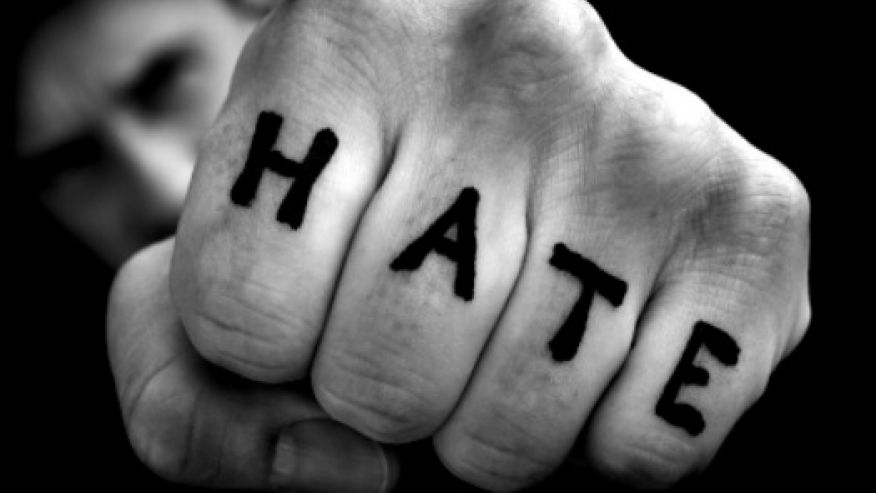
More than 400 incidents of harassment or intimidation have been reported following the election of Donald Trump, according to the Southern Poverty Law Center (SPLC). The civil rights organization released a report totaling 437 incidents nationwide through Monday evening, but said reports have continued to come in. Collected through news reports, social media, and direct submissions via SPLC’s #ReportHate page, the SPLC says these incidents, range from anti-Black to anti-woman to anti-LGBT incidents. There were many examples of vandalism and epithets directed at individuals. Anti-Black and anti-immigrant incidents were far and away the most reported with anti-Muslim being the third-most common. The category of “Trump” consisted of incidents where there was no clear racially defined target. There have also been reports of violence against Trump supporters. The SPLC has called on Trump to openly condemn these hate-based incidents. and asks that those who experience or witness harassment or intimidation to report it to both law enforcement authorities and the SPLC. And while President-elect Trump addressed the issue during an interview on “60 Minutes,” outgoing Senate Minority Leader Harry Reid thinks Trump needs to do much more. “Stop hiding behind your Twitter account. And show America that racism, bullying and bigotry have no place in the White House or in America,” Reid said. Here are a few examples of some of the reports: Georgia A Gwinnett County high school teacher said she was left a note in class Friday telling her that her Muslim headscarf “isn’t allowed anymore.” “Why don’t you tie it around your neck & hang yourself with it…,” the note said, signed “America!” Texas A Latina women reported: I was walking my baby at my neighborhood park and a truck drove by with a male driving and a female passenger. The female yelled “white power” at us as they drove by and then sped away. Oregon A Muslim woman was riding the Max to Beaverton in the early afternoon and a group of teenagers went to the corner of the car where she was sitting and got up in her face yelling at her that she was a terrorist, that our new president was going to deport her, that she can’t wear her hijab anymore. They got increasingly menacing, and my friend went over and made them get off the train. When they were leaving through the door they tried to spit on her. Aside from news reports, SPLC notes that these reports are largely anecdotal as every incident could not be immediately, independently verified.
Alabama Justice Tom Parker files lawsuit over speech restrictions
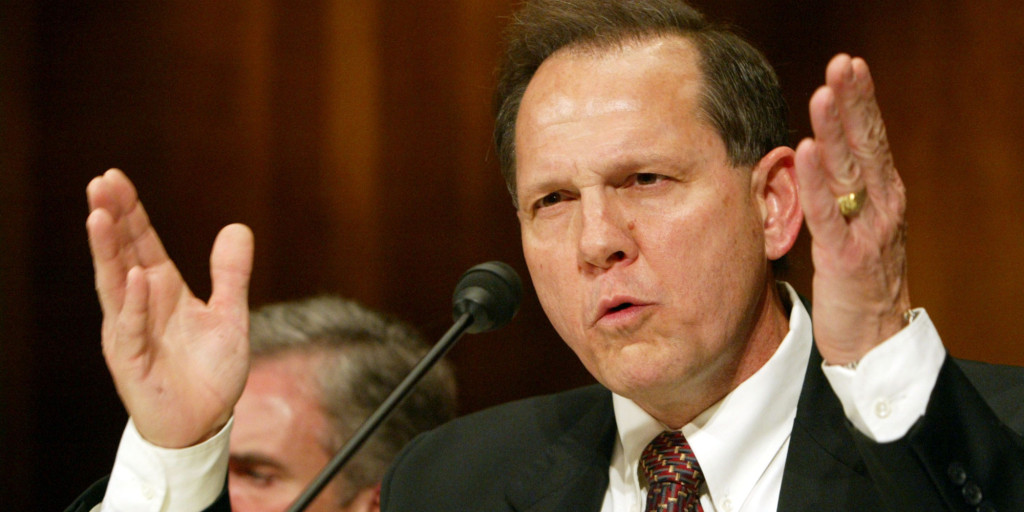
A bench ally of suspended Alabama Chief Justice Roy Moore has filed a federal lawsuit challenging what he called the state’s unconstitutional restrictions on judges’ speech. Associate Justice Tom Parker filed the lawsuit Wednesday against the state’s Judicial Inquiry Commission. The lawsuit challenges speech restrictions in the canons of judicial ethics. The Southern Poverty Law Center in 2015 filed a complaint against Parker over remarks he made on a conservative talk show criticizing the U.S. Supreme Court decision that legalized same-sex marriage. Moore was automatically suspended from office after the Judicial Inquiry Commission brought charges that Moore violated judicial ethics in his actions related to the fight over same-sex marriage. Parker’s lawsuit also challenges the automatic suspension provision. Republished with permission of The Associated Press.


